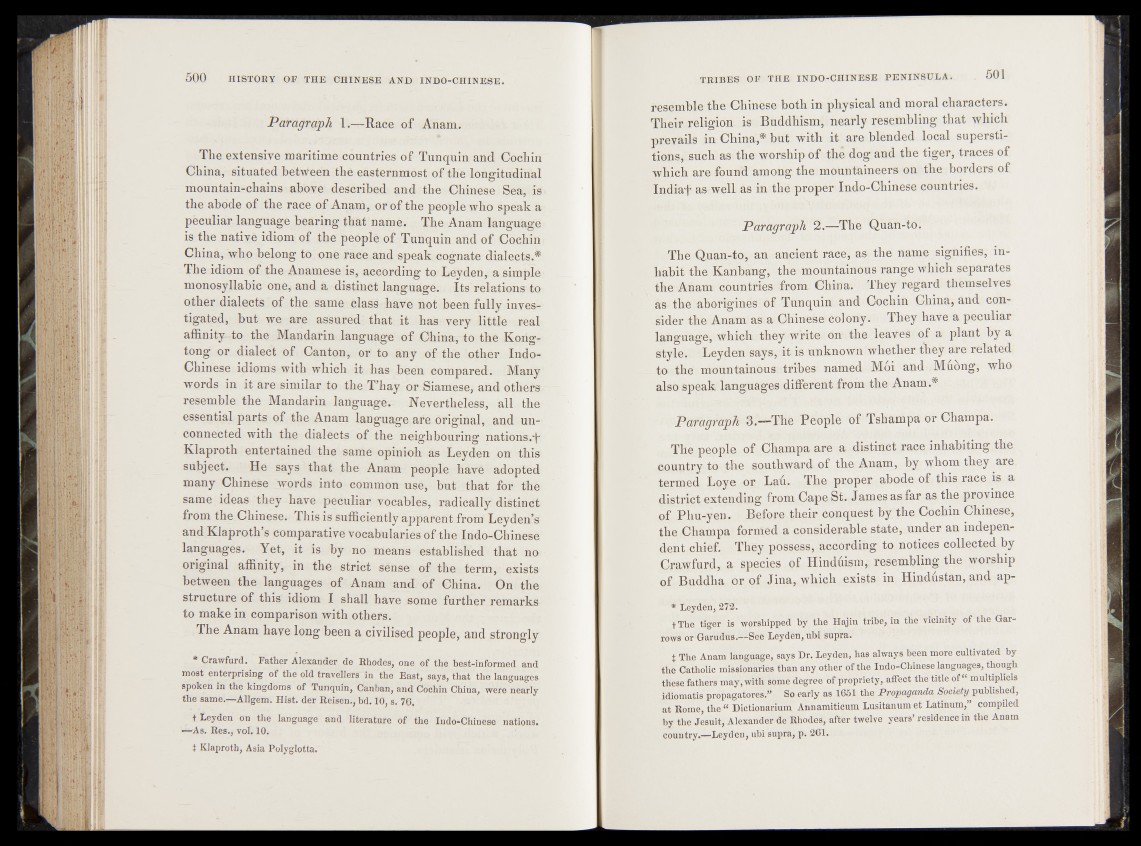
Paragraph l.*—Race of Anam.
The extensive maritime countries of Tunquin and Cochin
China, situated between the easternmost of the longitudinal ' ^ • « v ' ■ . U - J . . ' O jj mountain-chains above- described and the Chinese: Sea,. is
the abode of the race of Anam, or of the people who speak a
peculiar language bearing that name, The Anam language
is; the native idiom of the people of Tunquin and of Cochin ■
China, who belong to. one race .and speak cognate dialects,*
The idiom of the Anamese is, according to Leyden, a simple
monosyllabic one, and a distinct language. Its! relations to
other dialects of the same class have not been fully jinves-
tigated, but we are assured; thafejit has'^very?'littliiireal
affinity-to tb e . Mandarin language of China, to? the Korig-
tong or dialect of Canton, or- to any of the -other. Indof
Chinese idioms with which it has been compared;.- . Many’
words im it are similar to the T’hay or Siamese,' and others
resemble the Mandarin language." ^Nevertheless, all the
essential parts of the Anam language are original, and unconnected
with the dialects of the neighbouring nations.^
Klaproth entertained; the same opinioh as Leyden on th ü
subject. He says that the Anam people; havé adopted
many Chinese words into common üsé, but-Jhat for the
same ideas they have peculiar vocables, radically distinct
from the Chinese,- This is sufficiently apparent from LeydeuM
and Klaproth’s comparative vocabularies of the Indo-Chinese
languages. Yet, it is by no means established that np
original affinity, in the strict sense of the term, exists
between the languages of Anam and of China. On the
structure of this idiom I shall have some further remarks
to make in comparison with others.
The Anam have long been a civilised people, and strongly
* Pra'!^ >np ï’ Father Alexander de Rhodes, one o f thé best-informed and
most enterprising o ld ie old travellers'in the East, says, that the languages
spoten in the kingdoms of Tunquin, Cauban, and Cochin China, were nearly
the same.—Allgem. Hist, der Reisen., bd. IÓ, S. 70.
£ Leyden on the language and literature of the Indo-Chinese nations.
« “As. Res., vol, 10, |
t Klaproth, Asia Polyglotte.'
resemble tbe Chinese both in physical and moral characters.
TKeir religion, is Buddhism* nearly resembling that which
prevails in China,^ but with it are blended local superstitions*;
such as-the'worship ofisthe dog and the tiger, traces of
which are found among the mountaineers on the borders of
Indiaf as-well as in thé proper Indo-Chinese, countries.
Paragraph, 2.—Tbe Quan-to.
The Quan-to, an ancient race, as the name signifies, inhabit
tbe Kanbang, the mountainous range which separates
the Ahaim countries5-Trom: Öhina-. They regard themselves
as tbe aborigines:- of Tunquin and - Cochin ;China, and consider
the Anam as a Chinese5 ëoloRy.' They have a peculiar
language*, which they write, idm the. leaves* of a plant by a
styles Leyden'says,dtiis unknown whether they are related
-to thé mountainousrtrsïbes named Mod and .Mubngj who
also speak languages different from the1 Anam.*
Paragraph- 3.—The People of Tshampa or Champa.
The pepple of Champa are a distinct race inhabiting the
country to the southward of the:; Anam, by whom they are.
termed-bpye <or Lad. The proper ~abq,d.e of, this race; is a
district extending from Cape St. James a^fer as the province
of Phu-yen. jfefore their conquest by the Cochin Chinese,
the Champa formfed a considerably ^teyjunder an independent
chief. They possess,-according to, notices collected by
Crawfurd, a species of Hinduism^,resembling the, worship
of Buddha or of Jina,. which .exists^in Hindustan, and ap-
| * Leyden, 272‘.
fThe tiger is worshipped"^ tR é^ ^ ib trjbte, ib ffie'vVcinity of the Gar-
rows or Gariidus.-—See Leydëü, ubi supra.
' i The Anam language, says Dr. Leyden, has always been more cultivated by
the Catholic missionaries than any other of .the In^o-Chinese languages, though
tbese fathers may, with Some degree of-propriety, affect the title of“ multiplicis
idiomatis propagatores.” , p e a r ly as 1651,the Propaganda Society published,
at Rome, the “ Dictionarium, Annamiticum Lusitanum et Latinum,” compiled
by the JeBuit, Alexander de'Rhodes, after twelve years’ residence in the Anam
country.—Leyden, ubi supra, p. 261.